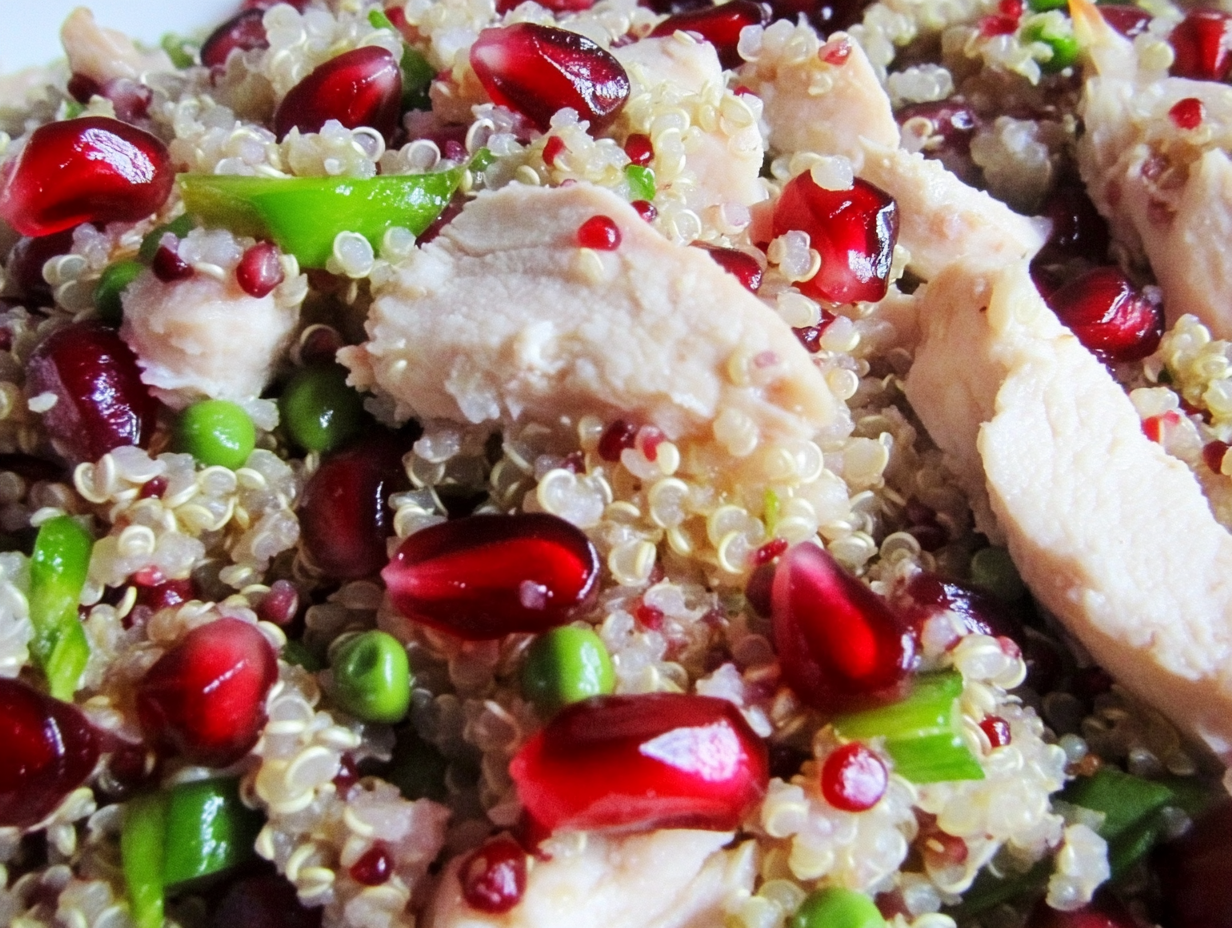Food can be a powerful ally in maintaining not only our physical health but also our cognitive well-being. While we often separate body and mind in discussions about health, the brain is an integral part of our physical form. This means that our dietary choices can significantly impact our cognitive health, including the risk of developing diseases like Alzheimer's. Dr. Smita Patel of Endeavor Health's Center for Brain Health emphasizes that "nutrition plays a critical role in overall health, including brain health and the risk of developing Alzheimer's disease." By understanding these connections, individuals can make informed choices that could potentially reduce their susceptibility to chronic, debilitating conditions.
So, what should we be having for lunch if we want to support our brain health and reduce the risk of Alzheimer's? Dr. Patel has a go-to recommendation: a Chicken Pomegranate Quinoa Salad. This dish is not only delicious but also packed with nutrients that support cognitive health. Let’s delve into what makes this lunch so effective and why you might want to add it to your regular meal rotation.
The Best Lunch for Alzheimer's Risk Reduction
Dr. Patel's recommended lunch might sound fancy, but it's actually quite simple to prepare. The main components of the Chicken Pomegranate Quinoa Salad include:
- 3/4 cup of quinoa
- 1 Fuji apple, chopped
- Pomegranate seeds
- 1/3 cup of almonds
- Mint and parsley for garnish
- Boneless, skinless chicken breast
What makes this salad particularly appealing is its versatility. For those who prefer a vegetarian option, mung beans can be substituted for the chicken. "It’s very versatile," Dr. Patel says. "You can make it vegetarian. You can substitute chicken for mung bean, a plant species in the legume family." As a busy doctor, Dr. Patel also appreciates that this salad is easy to prepare. "Parts of it can be prepped ahead of time, and you can add the dressing when you are ready to eat it. This is a refreshing and filling meal."
Your brain will likely agree. "I also like the balance of protein, veggies, and healthy fats, which can provide sustained energy and help stabilize blood sugar levels," Dr. Patel adds.
Nutritional Insights on Brain Health
What do all these nutrients have to do with Alzheimer's disease and cognitive health more broadly? There’s a growing body of research that supports the connection between diet and brain health.
Protein Power
One 2022 study indicated that animal protein consumption can help prevent cognitive decline in adults with plant-dominant diets. However, plant-based proteins also have a significant role to play. A large Harvard study involving 77,000 people over 20 years found that beans and legumes, particularly lima beans and peas, had the most protective link with cognitive decline.
Vegetable Virtuosity
Vegetables are another key component of a brain-healthy diet. A 2022 study found that older adults in Japan who consumed more vegetables were less likely to experience dementia. This highlights the importance of including a variety of vegetables in your meals.
Healthy Fats
Healthy fats, like those found in almonds, are also beneficial for brain health. A 2023 meta-analysis of more than 103,000 people reported that consuming foods rich in omega-3 fatty acids could reduce a person's odds of developing dementia and cognitive decline by around 20%.
Three More Tips for Maintaining a Brain-Healthy Diet
In addition to incorporating brain-boosting foods into your lunch, here are three more tips for maintaining a brain-healthy diet:
1. Avoid Ultra-Processed Foods (UPFs)
Dr. Patel warns that diets high in ultra-processed foods can increase the risk of developing various chronic conditions, including heart disease and dementia. A cohort study of almost 11,000 people found that ultra-processed foods were linked with higher rates of executive function decline. Common UPFs include sugary snacks, sodas, and fast food.
2. Embrace the Mediterranean Diet
The Mediterranean diet has been the U.S. News & World Report's top diet for several years running, and for good reason. "Since 1970, it has been one of the most well-known, well-studied diets for dementia, as well as for heart disease, metabolic syndrome, and type 2 diabetes," Dr. Patel notes. Studies have shown that people who follow the Mediterranean diet, which emphasizes fruits, vegetables, whole grains, and healthy fats, have lower signs of Alzheimer's disease.
3. Take Your Lunch Break
Finally, don't underestimate the importance of taking a proper lunch break. "Lunch breaks allow employees to detach from stress, recharge, and regain focus and energy to tackle the rest of the day more effectively," Dr. Patel explains. "Taking a dedicated lunch break encourages healthier eating habits, rather than mindlessly snacking or skipping meals." A 2014 study of students found that those who took shorter lunch breaks made less healthy dietary choices. Furthermore, a 2021 study suggested that even short breaks could help people learn new skills.
Conclusion
A commitment to brain health can start with something as simple as your lunch choices. By incorporating nutrient-dense foods like quinoa, chicken, pomegranate seeds, almonds, and a variety of vegetables, you can support your cognitive health and reduce the risk of Alzheimer's disease.
But remember, this is just one piece of the puzzle. A holistic approach including a balanced diet, regular exercise, and mental stimulation is essential for maintaining cognitive health. So why not start today? Prepare a Chicken Pomegranate Quinoa Salad and take a step towards a healthier brain.
Here's the link to the original article
Elli Cares is a dementia care mobile app designed to support independent living for people with dementia while providing peace of mind to their families. It's a valuable tool for anyone navigating the challenges of dementia care.






